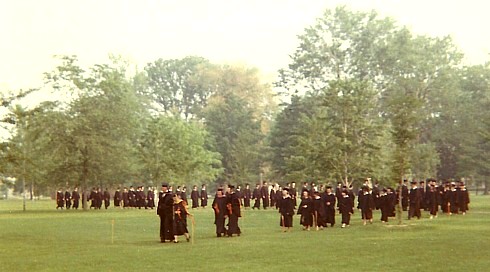Oberlin's Past
Much history has been recorded over Oberlin’s 190 years. Some of us told portions of that story for our 50th reunions.
For example, do you remember the old Conservatory building, Warner Hall (below), razed in 1964 to be replaced by the King Building?
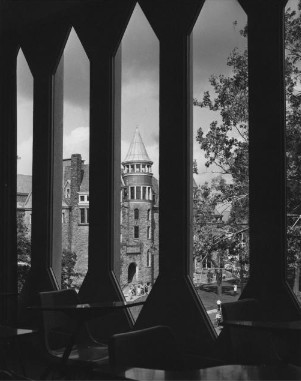
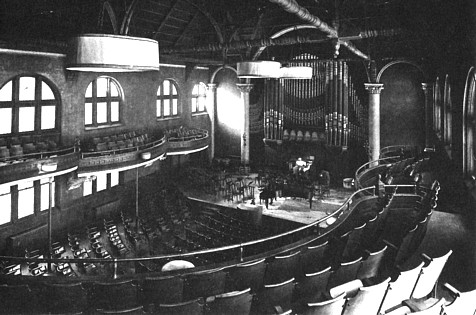
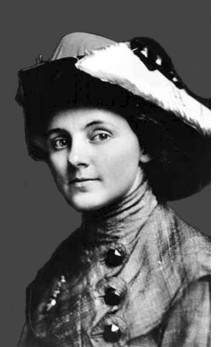
Going further back in time, Matthew Rinaldi ’69 showed us a picture of Anna Louise Strong of the Class of 1905.
“She became involved in the Seattle General Strike in 1919, was radicalized, and moved to ‘Soviet Russia’ in 1921, forever to remain in that new world. She lived as a communist journalist in the Soviet Union and China, passing away in China in 1970. In her autobiography I Change Worlds (as in moving from one world to another), she wrote of her Oberlin time in part as follows:
"'I came to one decision in Oberlin days which deeply affected my later habits of life.... I saw how people finished school and took jobs which they hated in order to pile up dollars.... I therefore resolved to keep myself independent by never becoming habituated to a soft standard of life.'”
Matthew also writes: "Edmonia Lewis, 1844-1907, of African and Ojibwe descent, has just been honored with a US postage stamp in the Black Heritage series. She attended Oberlin, where she added 'Mary' to her first name in order to fit in, but was still subject to harassment. Oberlin was not always the welcoming institution and town which is portrayed as Oberlin's heritage. Ms. Lewis left Oberlin without graduating, moved to Paris and became a famous sculptor. This stamp gives her some of the recognition she deserves, and she was granted an honorary degree by Oberlin in 2022."
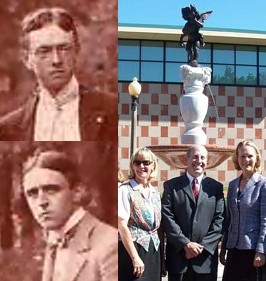 Tamme Haskell ’69 told how 22 Haskells went to Oberlin. “The first group of three included my grandfather Henry J. Haskell ‘96 (shown at top), editor of the Kansas City Star, winner of 2 Pulitzer Prizes. His books The New Deal in Old Rome and This Was Cicero were both translated into many languages and used in colleges and universities. In 1934 he donated an exact replica of Verrocchio’s Putto with Dolphin fountain to Oberlin, where it stands outside Allen Art Museum. I'm pictured in front of it with my sister Judy ’73 (far right) and Marvin Krislov. The fountain was in memory of my grandfather's second wife, Katharine Wright Haskell ‘98, sister of Orville and Wilbur Wright. My brother Harry wrote Maiden Flight about their love affair.
Tamme Haskell ’69 told how 22 Haskells went to Oberlin. “The first group of three included my grandfather Henry J. Haskell ‘96 (shown at top), editor of the Kansas City Star, winner of 2 Pulitzer Prizes. His books The New Deal in Old Rome and This Was Cicero were both translated into many languages and used in colleges and universities. In 1934 he donated an exact replica of Verrocchio’s Putto with Dolphin fountain to Oberlin, where it stands outside Allen Art Museum. I'm pictured in front of it with my sister Judy ’73 (far right) and Marvin Krislov. The fountain was in memory of my grandfather's second wife, Katharine Wright Haskell ‘98, sister of Orville and Wilbur Wright. My brother Harry wrote Maiden Flight about their love affair.
“Edward Haskell '94 (bottom left) and Mary Haskell '92 were Henry's Obie Theology Seminary siblings. They spent their lives as Congregationalist Missionaries in Bulgaria. Of Edward’s nine children, the majority went to Oberlin. His son, Douglas, was the Editor of the Architectural Forum. On and on. My only comment is that many of the Haskells are my claim to fame, for my achievements are not even in their sphere.”
John Barrer ’68, a pilot, was a docent at the Smithsonian Air and Space Museum, home of Orville and Wilbur Wright’s Flyer. He writes, “I was so happy to come across Tamme's story and Harry Haskell's podcast. It filled in a missing part of the story for me.” Click here for that missing part. Also, here are links to the podcast and some historic honorary degrees.
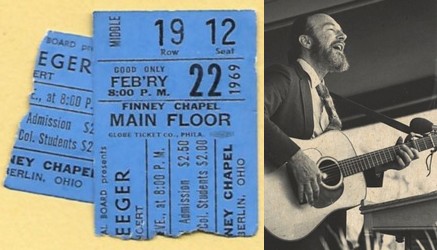
Beginning in 1954, folk singer Pete Seeger often performed on campus. These stubs are from 1969. Then in 1972, Pete wa honored as the Commencement speaker. Our friends in that graduating class have made available a recording of that commencement presentation, a combination of singing and talking in which he told the graduates, "We're either going to solve our problems or they're going to solve us."
Robert Krulwich ’69 gave a talk in 2016 about how Oberlin continues to shape his life. Here is a transcript. In particular, he recalled being torn between favoring the concept of drafting young people to serve their country while opposing the war in Vietnam. Which was right? He recalled Professor Clyde Holbrook talking about the sin of pride, of perfection, of being too sure of oneself — the danger of presuming to know what’s right. We must be determined to do good, while at the same time knowing that everything we think, everything we believe, everything we want, might be wrong.
“In the 1960’s, Oberlin talked mostly to itself. We celebrated our anti-war heroes, our civil rights heroes, our antipoverty heroes, but we didn’t mix it up with the anti-taxing, law-and-ordering, government-fearing, conservative tide that was rising all around us. We didn’t have them here. We didn’t want them here. And we liked it that way. Well, I didn’t. I wanted to mix it up with those people. One day, I knew I’d be working with them, selling to them, talking to them. Lately, I wonder about these efforts to keep students “feeling safe,” trigger warnings and the rest. Feeling safe — that I understand. But feeling uncomfortable? College shouldn’t be about making you comfortable. Quite the opposite.”
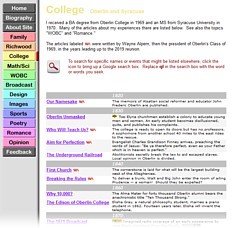 Tom Thomas ’69 has posted dozens of articles on his own personal website, linked from this index page.
Tom Thomas ’69 has posted dozens of articles on his own personal website, linked from this index page.
A few of the historical stories include John Frederick Oberlin, a disaffected early student, the arrival of the Underground Railroad, the Obie who invented the telephone, an early appearance by the Fisk Jubilee Singers, reunions in 1919, and the beginnings of WOBC.
Our era is represented by topics such as Martin Luther’s King’s Commencement address, our marching band, Kettering and a lecture therein, voting in 1968 for Student Senate and the Mock Convention, and audio of a dramatic confrontation with President Robert Carr on the steps of the Administration Building.
“For more than a half century,” wrote Michael Mechanic for The Atlantic in April 2023, “researchers at UCLA have conducted a massive annual survey of freshmen entering four-year colleges.” One part asked the students to rate 20 life goals. “Most are lofty aspirations such as becoming a community leader, contributing to scientific progress, creating artistic works, and launching a successful business.” Which goals are rated “essential” or “very important”?
In 1969: developing a meaningful philosophy of life 85%, raising a family 73%, and helping others who are in difficulty 69%.
In 1979: being an authority in my field 74%, followed by helping others and raising a family.
By 1989, however, times had changed. "A new priority had taken over the survey’s top position, and has appeared there on and off ever since: money. Indeed, the No. 1 goal in life for the Class of 2023 was being very well off financially.”
If you have stories to add, let us know!


